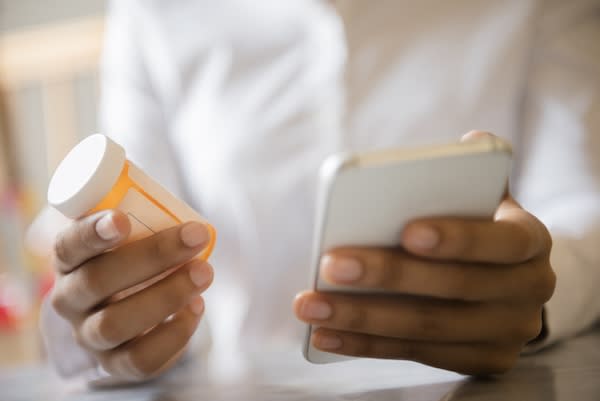
[6 MIN READ]
In this article:
-
For many over-the-counter medications, it’s not really dangerous to take them past their expiration date. However, they may not work as well as newer medications.
-
Certain medications should never be taken past their expiration date, including birth control pills, insulin, thyroid medications and anti-platelet medications.
-
The best way to safely dispose of unneeded medications is to bring them to a drug take-back location.
Expired medication guide: Safety, effectiveness and when to dispose
Whether you are dealing with a cough, headache or sinus infection, you may have been tempted to reach for a bottle of expired medicine to relieve your symptoms. But is it safe to take these expired medications? Will they work? What are the risks? Which ones should you avoid altogether?
Understanding medication expiration dates
According to Sarah Pace, M.D., a Providence internal medicine doctor who sees patients in Laguna Hills, California, the Food and Drug Administration (FDA) has found that 90% of medications are still safe to use past their expiration date, as long as you store them correctly.
“However,” she says, “asking your doctor or pharmacist is the best way to check if your medication — especially lifesaving medication, gels or liquids — is still safe.”
That doesn’t mean expired drugs are always safe. There is a potential risk of them losing potency, growing bacteria or leading to antibiotic resistance.
The expiration date on a medication, says Dr. Pace, is the last day the manufacturer ensures the full potency and safety of the drug. A 1979 law requires this date to be printed on the medication packaging.
The shelf life, however, refers to the quality or effectiveness of the medication over time. It is typically much longer than the expiration date, as long as the medication is stored correctly and in the original container.
Expired OTC pain relievers: Ibuprofen and acetaminophen (Advil and Tylenol)
Tylenol, the most commonly used brand of acetaminophen, has a shelf life of two to three years. According to the manufacturer, if it is used after its shelf life expires, it could be only 80% as effective.
Ibuprofen (which is most commonly sold under the brand names Advil and Motrin) has a shelf life that is longer than the printed expiration date. You can safely take it a few months past its expiration date, but not a few years later.
Expired antihistamines: Benadryl, Zyrtec, Claritin
As with pain relievers, antihistamines aren’t really dangerous to take after their expiration date. However, as time goes on, they will likely become less effective.
Expired antibiotics: Amoxicillin, azithromycin, doxycycline
“People tend to stockpile antibiotics, which usually means they did not take all of the prescribed medication the last time they were sick — an entirely different issue,” says Dr. Pace. “Expired antibiotics typically lose some of their potency, which means it’s unlikely they’ll completely kill the bacteria that is causing your infection.”
Further, she says, they may not be the right kind of antibiotic for the type of infection you have. When you take the incorrect antibiotic, it helps bacteria develop a resistance to the medication. That means the next time you need the antibiotic, it may not work when you need it the most.
If you’re struggling with an illness or infection, it’s important to schedule an appointment with your primary care physician to get the right medication for your illness.
Expired prescription medications
The most dangerous medications to keep in the home after you no longer have a use for them, says Dr. Pace, are medications with abuse or overdose potential. “Keeping these medications out of the home is important for the safety of children and young adults,” she says.
These medications include:
- Anxiety medications such as Xanax
- Cough syrup with codeine
- Prescription opioid pain medicine such as oxycodone and hydrocodone
- Phenergan, an anti-nausea medication
- Sleeping medications such as Ambien
Additionally, Dr. Pace says, certain medications should never be taken past their expiration date:
- Birth control pills: Even the slightest variation in the hormone levels can allow for ovulation to occur.
- Insulin: Insulin loses its effectiveness quickly and often expires within 30-60 days of being opened. “I see people in the emergency department with diabetic ketoacidosis (a condition in which there isn’t enough insulin in the body) because they were using expired insulin,” Dr. Pace says. “Be sure to get specific guidance from your pharmacist for your prescribed insulin.”
- Thyroid medications: Older medications may not be able to effectively stabilize thyroid-stimulating hormone (TSH).
- Anti-platelet medications: Blood thinners are often prescribed after a blood clot or placement or a heart stent or valve and can lose their effectiveness over time, which can be fatal.
Other medications that control potentially life-threatening conditions like epilepsy, asthma, diabetes or heart failure should be taken with great care and attention. Using old, expired, discolored or broken medications can be harmful.
How storage affects medication shelf life
While many people store their medications in the bathroom, that’s not the best place for them. The reason is because bathrooms often become hot and humid, which can make medications break down faster, causing them to lose their effectiveness before the expiration date.
Instead, keep your medications in a cool, dry place, like a dresser drawer or in a storage cabinet. When you need to refrigerate medications, keep them away from the refrigerator cooling unit so you don’t accidentally freeze them.
“If you have children in the home,” says Dr. Pace, “it's important to make sure all medications are out of reach.”
Liquid medications vs. pills: Expiration differences
Most expired pills and tablets are not harmful to your health, says Dr. Pace, as long as they are stored in a cool, dry place — though they may lose some of their effectiveness. Gel capsules are sensitive to heat and humidity and may begin to break down if stored improperly, even before their expiration date. Before taking any gel, pill or tablet medication, you should examine the pills and bottles to make sure they are not broken, open, sticky or discolored.
“Liquid medications are prone to infection-causing bacterial growth, which can be particularly dangerous for eye drops and lead to conjunctivitis,” Dr. Pace says. “Patients should look for liquid medication with individual-use packaging and not use it past its expiration date.”
“Liquid medications often have more specific storage requirements and instructions than pills or tablets,” Dr. Pace continues. “Nitroglycerine, for example, is extremely sensitive to heat and sunlight and must be stored in a dark-colored bottle, and certain chemotherapy drugs must be stored in glass bottles in the refrigerator. It’s important to keep these drugs stored properly to make sure they work as effectively as possible.”
Proper medication disposal methods
The best way to dispose of unwanted or unneeded medications is to bring them to a drug take-back location.
“You should always discard medications with needles in ‘sharps’ containers, which are often accepted by pharmacies or drug manufacturers,” says Dr. Pace.
If it’s time to do a little cleaning out in your medicine cabinet, the U.S. Drug Enforcement Administration offers an easy way to search for authorized collection sites where you can safely and securely dispose of prescriptions containing controlled substances and other unused medicines.
In your community, authorized drug disposal sites may include retail pharmacies, hospital or clinic pharmacies, and law enforcement locations. Find a take-back location near you. Take-back days happen at certain times during the year, depending on where you live.
Another option for unused medication disposal is to mix it with cat litter or coffee grounds in your household trash so others would not be able to dig it out of the garbage.
Still not sure?
If you're unsure whether you should dispose of your old/unused medication or have questions, contact your primary care or internal medicine physician.
Contributing caregiver

Sarah Pace, M.D., is a Providence internal medicine doctor who sees patients at Mission Heritage Laguna Hills.
Find a doctor
If you are looking for a primary care provider, you can find what you are looking for in our provider directory. Through Providence Express Care Virtual, you can access a full range of health care services.
Download the Providence app
It’s all in the app: easily stay connected with Providence and your health. With the Providence app, you can schedule appointments, have virtual visits from the comfort of your home, get personalized health recommendations, access your health records and so much more. Learn more and download the app.
Related resources
Overwhelmed by medications? What you should know
Take control of your blood pressure
Explore your options for non-invasive pain relief
This information is not intended as a substitute for professional medical care. Always follow your health care professional’s instructions.
About the Author
More Content by Providence Health Team





















